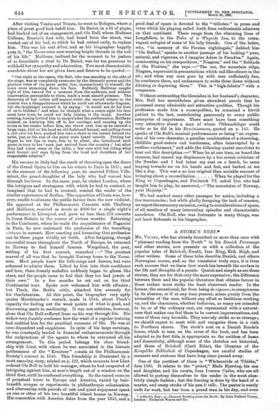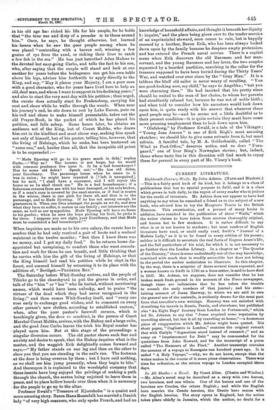A STORK'S NEST.*
Ma. VICARY, who Iran already furnished ns more than once with "pleasant reading from the North" in his Danish Parsonage and other stories, now presents us with a collection of the popular tales of Brosboll, Ewald, Ivar Ring, Erik Bfigh, and other writers. Some of these tales describe Danish, and others Norwegian scenes, and, as the translator truly says, it is from such sources that we learn how much lies beneath the surface in the life and thoughts of a people. Quaint and simple as are these stories, they are for that only the more expressive; the difference between them and the popular literature that obtains favour in these realms must strike the least observant reader. In the former, the sensational, far from being de rigueur, is conspicuous by its absence, or if at any time present, arises purely from the necessities of the case, withont any effort or factitious working - up, and the characters, whether ludicrous, as many are intended to be, or of the ordinary east, are represented with a natural- ness that makes one feel them to be correct impersonations, and some of them very loveable. They scarcely strike us as strange; we should expect to meet with and recognise them in a visit to Northern shores. The stork's nest on a Danish Bonde's house, which is seen on the cover of the book, and has been adopted as its first title, is appropriate as the emblem of hosse and domesticity, although some of the sketches are historical, and those of Brosboll (Carit Etlar), the librarian of the Songelike Bibliotheh of Copenhagen, are careful studies of manners and customs that have long since passed away.
One of the prettiest of these is " Whitsuntide at Tibirke," date 1760. It relates to the " priest," Made Bjerring, his son and daughter, and his curate, Jens Iversen Carbo, who are all allowed to portray themselves to the reader in the most alum- • lately simple fashion; but the limning is done by the hand of a master, and every stroke of his pencil tells. The pastor is nearly unfit for work, but has been a grand man in his day, and even
• A Stark's Nest ; or. Pleasant Beading from the North. By John Fullord Vicary, LI:onion Frederick Warne and Co. in his old age .has risked his life for his people, for he holds that "the true use and ,ditty of a preaobe is to those around him." Once, he says, he thought otherwise, but learned his lesson when he- saw the 'poor people among whom he was placed "contending with a barren soil, winning a few grains of rye from the sand, or risking their lives to catch a few fish in the sea." He has just betrothed Adne Malone to the devoted but easy-going Carbo, and tells the fact to his son, who, after saying that the couple will stand and look at one another for years before the bridegroom can get his own table above his legs, advises him forthwith to apply directly to the King, and say, "May it please your Majesty, I am a poor man with a good oharaoter, who for years have lived here to help an old, deaf man, and whom I want to support in his declining years ;" and also to start the very next day with his petition ; thus urged, the curate does actually start for Fredensborg, carrying his coat and shoes while he walks through the woods. When near his journey's end, he sits down to rest by Lake Esrom, puts on his ruff and shoes to make himself presentable, takes out the old Prayer-Book, in the pocket of which he has placed his petition, and falls asleep. Some hours later, he obtains an -audience not of the King, but of Count Moltke, who draws him out in the kindliest and most clever way, making him speak not only of himself, but of his pastor, telling him, however, that the living of Helsinge, which he seeks, has been bestowed on "some one," and, harder than all, that the incapable old priest is to be superseded Made Bjerring will go to his grave mach in debt,' replies Carbo.—' Why so? The income •is not large, but he would with common prudence live upon it. Is be a bad housekeeper? Has he some old debts? Speak out.' He has old- debts, your Excellency. The parsonage house when be came to it was in rains; he might have repaired it [? left it unrepaired], but he said, "I shall have a successor, and I will repair the house no as he shall thank me." He is a bad housekeeper; if a fisherman returns from sea with his boat damaged, or his nets broken, or if a man's corn is covered by the sand-storms, or if fuel is scarce in the winter, there is one path for them all, and that is to the parsonage, and to Made Bjerring. If he has not money enough, he guarantees it. When one lives amongst the people as we do, and sees what they have to suffer, it makes us one family ; our interests are the same, as well as our sympathies. Made Bjerring will have no fence to his garden; when he sees the boys picking bis fruit, he picks it for them. I suppose you are right, your Excellency, and that Marls must be considered a bad housekeeper.' " When inquiries are made as to his own salary, the curate has to confess that he had only received a pair of boots and a wadmel waistcoat in the twelve months; " but then I knew there was no money, and I. got my daily food." So he returns home dis- appointed but unrepiuing, to comfort those who want console. tion and work for those he can benefit, and little thinking that he carries with him the gift of the living of Helsinge, or that the King himself had read his petition while he slept in the forest, and amused himself by returning it to its place with the addition of, " Bevilget.—FIIEDESIK BEE."
The Saturday before Whit-Sunday arrives, and the people of Tibirke go to the churchyard to put the graves in order, and talk of the " him " or " her " who lie buried, without mentioning names, which would have been unlucky, and to praise " the virtues of the dead which they had never recognised in the living ;" and then comes Whit-Sunday itself, and "every one rose early to exchange good wishes, and to comment on every other person's new clothes, according to established custom," when, after the poor pastor's farewell sermon, which is touchingly given, the dela ex machind, in the person of Court Marshal Count Moltke, arrives,with the Bishop and a large suite, and the good Jens Carbo learns the trick his Royal master has - played upon him. But at this stage of the proceedings a singular diversion occurs. The old pastor shows such fear and anxiety and desire to speak, that the Bishop inquires what is the matter, and the waggish Erik delightedly comes forward and says,—" My father stands on one leg and then on the other to show you that you are standing in the ant's run. The footman at the door is being overrun by them ; but I have said nothing, as we shall see him jump presently, when they begin to bite." And thereupon it is explained to the worshipful company that these insects have long enjoyed the privilege of making a path through the church, the sexton being enjoined to leave them in peace, and to place hollow boards over them when it is necessary for the people to go up to the altar.
Professor Ewald's "Treasure of Kjcersholm" is a quaint and more amusing story. Baron Hans-Resenfalk has married a Danish lady " of very high manners, who only spoke French, and had no
knowledge of household affairs, and thought it beneath her dignity t ) inquire," and the place being given over to the tender mercies of an unprincipled steward, soon comes to ruin, but ie happily rescued by a brother, Baron Erik, who has been always looked down upon by the family because he despises empty pretension, and has entered the French naval service. There is a capital scene when Erik discovers the old Baroness and her man- servant, and the young Baroness and her lover, the two couples separated by a boarded partition, searching in the cellar for the treasure supposed to have been buried daring the Thirty Years' War, and watched over ever since by the " Gray Man." It is a tableau the bluff old sailor is never weary of recalling. " Yon are good-looking now, my child," he says to Angelika; " but you were charming then." He had insisted that his pretty niece should be united to the man of her choice, to whom her parents had steadfastly refused her, because he was not of noble birth ; and when told to consider how his ancestors would look down upon him, is quite ready with his answer that wherever these good people may be—and he seems not a little doubtful as to their present condition—it is quite certain they must have some more pressing employment than to look down upon him. " Olufsborg," by Professor Ewald, is a tale of the Vikinger; "Young Jens Jensen" is one of Erik Bogb's most amusing sketches ; we should like to give some extracts from it, but must refrain. A fanciful tale, by M. A. Goldschmidt, called "The Wind as Post-Office," deserves notice, and so does " Fara- gaard," one of Ivar Ring's Norwegian stories; but, indeed, those whose taste lies in this direction will find much to repay them for perusal in every part of Mr. Vicary's book.















































 Previous page
Previous page